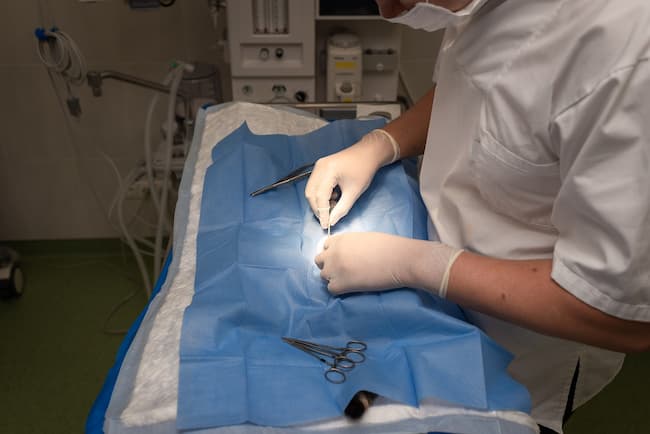When Should I Neuter or Spay My Puppy?
It's common for new puppy owners to wonder at what age they should spay or neuter their new puppy... and there's no one-size-fits-all answer.
The traditional recommendation of always spaying or neutering at a young age (before six months of age), regardless of size or breed, is no longer supported by the majority of veterinarians, research or studies.
Large breed dogs and small dogs grow and mature at very different rates, and the best time to neuter a small breed puppy could be quite different from the best time to neuter a large breed puppy, in terms of how it impacts growth, development and health.
On this page you can find the information you need on all of the above, so that you can make the best decision for YOUR puppy, ideally getting the benefits of spaying/neutering, while minimizing associated risks.

When Should I Neuter My Puppy?
Although breed size affects the rate at which a puppy matures to adulthood, there are some breeds which don't fit within the normal guidelines.
The Swedish Vallhund is one of them. This breed is still fairly rare here in the US, but it's growing in popularity. Although the average height and weight of this breed is 12.5" and 28lbs, Vallhunds mature very slowly and don't reach sexual maturity until around three years old.
For this reason, it's best not to neuter or spay a Swedish Vallhund until around this age, to allow for full hormonal and physical maturity.
When Should I Neuter My Puppy?
There are a lot of factors to consider when deciding when to spay or neuter, and there are also contradictions and implications in terms of the health impact (both positive and negative) of both procedures.
Because the age at which a puppy is neutered can impact his health, longevity and behavior, the best age at which to do it varies depending on the breed and size of your puppy.
Because smaller breeds and tiny dogs mature faster than the large or giant breeds (such as the Rottweiler or Great Dane) and recommendations are still to neuter them before six months of age, or at least before sexual maturity.
Big dogs grow, develop and mature more slowly, and their growth plates close at a later age.
Muscle, bone and joint development continues until growth plates are fully closed and because neutering/spaying can hamper the progress of this development it puts large and giant breed dogs at an increased risk of developing orthopedic problems.

Veterinarians and researchers now suggest that waiting until after a large breed puppy is fully grown, developed and sexually mature before spaying or neutering is best for healthy growth, bones, joints and ligaments.
Pros and Cons of Neutering You Puppy or Dog
There are two sides to every coin, and neutering your puppy has both potentially positive, and negative, consequences. The age at which you choose to have him neutered can increase, or decrease, the impact of both pros and cons.
Positives Related to Neutering Your Puppy
PRO#1 Neutered Male Dogs live longer than intact male dogs
There are pros and cons to neutering, but overall studies have shown that in general neutered male dogs live longer than intact male dogs. When we look at the numbers it's possible that this is largely due to the fact that neutering removes the risk of testicular cancer in male dogs because it removes your dog's testicles!
Studies have shown that neutered male dogs have an approx. 18% increase in lifespan when compared to intact males
Simultaneously other studies have shown that between 16% and 27% of intact male dogs will develop testicular cancer during their lifetime, and that number seems to have increased over time.
The age at which a puppy/dog is neutered has little impact in this situation, as long as it is done before cancer is detected.
Although testicular tumors in dogs are generally slow to spread to other areas of the body, and treatment/prognosis is good, this is still a significant finding and obviously important for pet owners to consider when deciding whether or not neuter a puppy.
PRO#2 Neutering your puppy can reduce the risk of prostate problems
Neutered dogs are less likely to develop prostate disease (such as Prostatic Hyperplasia), or to have their prostate become enlarged. The age at which the neuter takes place doesn't seem to have significance here, as long as it's done before the disease develops.
PRO #3 Neutering can reduce/eliminate undesirable behaviors in male dogs.
Certain behaviors start in adolescence and peak as puppies become sexually mature. Neutering your puppy will often either reduce, or even eradicate these traits. They include:
- Marking their territory (by lifting their leg), this can be indoors as well as outdoors
- Humping other dogs, pets or even people/children
- An increase in territorial/guarding or aggressive behavior
- An intense interest in female dogs (if an intact female is anywhere within scenting distance your dog will lose his mind!)
- Roaming. Intact male dogs are more inclined to roam than neutered males, especially if there's a hint of a female dog in season anywhere within a pretty impressive radius!

It's important to know that not all intact male dogs exhibit these behaviors.
I have a three year old intact German Shepherd (not because I wanted to breed him or anything of that nature, simply because he was, and still is, HUGE, and my veterinarian recommended waiting until at least 18 months to neuter him.
By two years old he finally seemed to be reaching his maximum growth/weight/muscle mass but as he was showing zero signs of undesirable behavior and is the sweetest boy ever, I decided to go ahead and leave him intact. A personal choice!.
The age at which puppies reach sexual maturity varies with size and breed, and will often be seen in a small breed pup by 6 months of age, but not yet be clear in a one year old puppy of a large, or giant breed.
PRO#4 Neutering eliminates your puppy's ability to reproduce!
This sounds obvious, but it's so obvious that it's sometimes forgotten. There are millions of unwanted pets in the USA, they're either in city pounds or animal shelters, or trying to stay alive out on their own. Pet overpopulation is heartbreaking and unnecessary. Neutering or spaying the family pets prevents 'oops' litters and if everyone did it, it could go a long way towards reducing the number of strays/homeless/unwanted dogs and cats out there.
Of course, you can prevent accidental mating of your pup by making sure you have a safely fenced yard and always having your dog on a leash when you're out and about. If you have puppies of both sexes, clearly at least one of them will need to be altered!
In order to prevent any risk of your pup fathering a litter, you would need to have him neutered before he reached sexual maturity (anywhere between approx. six month and eighteen months of age, depending on breed and size).
Negatives Related to Neutering Your Puppy
CON #1 Neutering can cause negative health issues
This is one of the reasons that veterinarians are now open to the idea that large breeds should not be neutered before they're six months old. This is because neutering before sexual maturity can have a negative impact on muscle development and bone/joint development (sexual maturity could occur as late as 15-18 months in extra large or giant breed dogs) .
Basically if neutered to early, these large dogs may never reach their full size/weight and their bones and ligaments may not be optimally developed. Studies have shown that large breed puppies neutered before they reached one year old have an increased risk of cranial cruciate ligament tears, and can also put them at risk for certain joint disorders and orthopedic issues as adults.
Some studies have shown an increased risk of Osteosarcoma (a type of bone cancer) in neutered dogs, but there are breed/genetic components which mean this is not necessarily true for all breeds. For Rottweilers, being neutered before one year of age caused an increased risk, while for German Shepherds neutering didn't seem to increase their chances of getting Osteosarcoma, regardless of the age at which it was done.
One study has found an increased risk of Lymphoma in male Golden Retrievers who were neutered before one year of age, however other studies haven't shown any difference in the occurrence of lymphoma in neutered or intact males of other breeds (German Shepherd and Labrador Retrievers). It is logical to think that there may be many other levels of risk with other breeds but as yet there is no definitive research on that. This is really only relevant if you have a Golden Retriever puppy.
Canine prostate cancer is rare, and the risk factor varies between breeds, however some studies show that neutering may slightly increase that risk. There's no hard evidence that the timeframe for the neuter affects this.
Another impact on health that can be a result of neutering/spaying your puppy is an associated weight gain. This is believed to be at least partly due to metabolism changes. Regardless of what age you neuter your puppy he is likely going to be heavier than he would be if he stayed intact. Obviously weight can be managed with diet and exercise, and there's no reason for a neutered dog to become obese. But weight management will most likely be more of a challenge if your pup is neutered.
CON#2 All surgeries have risks
The neuter surgery is a relatively simple one and not considered high risk. It is a quicker, and simpler surgery than spaying. Veterinarians are very familiar with the procedure and may well do thousands of them over a lifetime. However, any surgery carries inherent risk, and your puppy will need to be under full anesthesia for this surgical procedure. Neutering older dogs carries a greater risk than neutering puppies, and older dogs may well already have health issues, be overweight, or have any other number of risk factors.
When Should I Spay My Puppy?
As with neutering, the age at which you spay your puppy can have an impact on her both physically and emotionally.
All of the points relating to the benefits of delaying a neuter surgery until a puppy is sexually mature and fully developed, apply to spaying in the same measure.

A spayed female dog has a longer life expectancy than an intact female because of the decreased chances of developing certain cancers or conditions, the most impactful being mammary cancer.
Veterinarians usually recommend that you spay your puppy before her first heat cycle because this can reduce her chances of developing certain cancers or conditions. In small breed dogs this usually happens by about six month of age, larger and giant breeds may be twelve, or even fourteen, months old before they first come into season (another name for heat cycle).
Now we can take a look at the pros and cons of having your puppy spayed, and how the age at which the surgery is done could affect her health and longevity.
Positives Related to Spaying Your Puppy
PRO#1 Spaying can potentially eliminate the risk of mammary tumors
One of the most important health benefits of spaying your puppy before her first heat cycle is that it can significantly reduce the risk of her developing mammary gland tumors (aka mammary cancer, which is the canine equivalent of breast cancer) . Small breeds have a higher risk of of developing mammary tumors than larger dogs.
Research indicates that the chances of a puppy developing mammary cancer before her first season is 0.05%) but this rises with every heat cycle. So with larger breeds there's a need to balance the higher mammary cancer risk, against the risks associated with her physical development in terms when deciding on the best time to spay them.
PRO#2 Spaying your puppy also reduces other cancer risks
Because a spay surgery is basically a canine ovariohysterectomy (ie all the internal reproductive organs are removed, ie uterus and ovaries) it also eliminates the risk of several other female canine reproductive organ cancers such as ovarian cancer or uterine cancer, and can help protect against cancers of the vagina and/or vulva.
With these cancers there's no clear evidence as to the impact of the timeline of a spay, as long as it is done before the cancer starts.
PRO#3 Spaying eliminates the chances of a uterine infection
Because your spayed puppy no longer has a uterus, uterine infection is no longer a risk. Pyometra is a severe, potentially deadly uterine infection that can affect intact female dogs and spaying your pup eliminates this risk. Although the age at which the spay surgery is performed doesn't affect the risk factor here, because Pyometra is relatively common, intact females are at risk of developing it as long as they have a uterus.
PRO#4 Spayed female dogs don't have heat cycles
If you've ever had to deal with the inconvenience and mess of a female dogs heat cycle (which lasts 7-14 days on average), you'll understand why NOT having to do that can be quite liberating.
Apart from the doggie diapers and other ways to keep the blood from staining your carpet and furniture, a female dog in season will be restless and want to get out to find a local male dog. Any intact males in your vicinity will be well aware of your in-season female and will line up at your door (or outside your fence). Literally. So, spaying your puppy can actually help you avoid this recurring inconvenience.
PRO#5 Spaying means your dog won't be able to reproduce
Your dog obviously won't be able to have puppies. So in addition to not adding unwanted puppies to the overpopulation of dogs in the United States (or wherever you live in our world), she also won't face the risks of pregnancy and birth.
Although most dogs carry and birth puppies without any problems, specific breeds can have higher risk pregnancies. These are often breeds who have strayed far from the norm in terms of physical attributes which makes it more difficult for females to give birth, including English Bulldogs, French Bulldogs, and some of the tiny breeds.
The only time factor involved here is that if every heat cycle your puppy has potentially puts her at risk of an accidental pregnancy unless you are extremely careful and vigilant.
Negatives Related to Spaying Your Puppy
CON#1 Spaying your puppy can cause negative health problems
Although spaying can prevent, or lower the risk of, some very serious health conditions, it can also put your puppy at higher risk of some others.
Hemangiosarcoma in dogs is a fairly common cancer, but it is also a serious one. It begins in the cells which line a dog's blood vessels, is aggressive and spreads throughout the body. Some studies have shown that female Golden Retrievers and Vizslas who have been spayed are at increased risk of this type of cancer if they were spayed at more than one year of age. There are no studies available on other breeds so again, this is really only relevant if you own a Golden Retriever or Vizsla puppy.
Studies show that spayed female dogs have an increased risk of developing Osteosarcoma (bone cancer). For female dogs there is no data on whether the age at which a puppy is spayed has any impact on this.
Some studies also indicate that mast cell tumors may occur more often in spayed female dogs, but breed and genetics play a much bigger role.
Urinary incontinence is more common in spayed females than intact females and can happen immediately after surgery (sometimes this is temporary, sometimes not), or develop over time due to either physical issues from the surgery or hormonal ones. It is likely the most commonly seen side effect.
Results of research shows that whether the spay procedure was done before six months, or soon after the first heat cycle did not increase the risk for developing incontinence later on. However, females who were older when they were spayed tended to develop incontinence more quickly.
CON#2 Spay surgery can lead to weight gain
Spaying your puppy can result in subsequent weight gain, especially when older or an adult. This is likely due to both metabolic and physical effects of the surgery, and can generally be controlled with appropriate diet and exercise before obesity becomes an issue. But it will likely be more difficult for your spayed pup/dog to keep her svelte figure and at optimal weight long term.
CON#3 Behavioral Changes after spaying in female puppies
When you spay your puppy you may see some behavioral changes afterwards over time. Whereas evidence exists that neutering male puppies is likely to reduce/eliminate some problematic intact male behaviors, this isn't necessarily true in females. Studies that have been done tend to be inconclusive, even conflicting at times. You MAY see an increase in dominant behavior in your puppy after she's been spayed, or you may see an increase in anxiety, barking or territorial habits. Or nothing may change.
CON#4 All Surgeries have risks
The spay surgery is a bigger, and more complicated surgery than the neuter one is, but it's also extremely common and veterinarians and familiar with it and skilled at performing it. As with any surgical procedure your puppy will need to be under full anesthetic and there is always the chance of something going wrong, or an unexpected complication.
Spaying a young, healthy puppy is less risky than spaying a middle aged or older dog even if they don't have any known health issues. Dogs who are in heat should not be spayed at that time because it can cause additional bleeding complications.

Summary
Here is a summary of are the take aways when it comes to answering the question of when you should neuter, or spay, your puppy:
- There is no one-size-fits-all answer to 'When should I neuter or spay my puppy?'
- Recommendations and research findings are changing and moving away from 'always spay/neuter before 6 months of age
- Neutering can reduce the risks of some serious health conditions (as can spaying), however these procedures can also increase the risk of other health problems, some of them equally serious
- Breed, size and genetics play a role in when it's best to neuter a puppy, and risks vary depending on those factors (same for spay)
- Overall studies and statistics show that neutering or spaying a puppy can outweigh the risks of NOT doing so, as long as dog owners consider their puppy's size, breed, physical development and sexual maturity are considered when deciding at what age to have the procedure done.
You Might Also Like:
- Home
- Puppy Health Care
- When Should I Neuter Or Spay My Puppy



